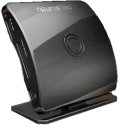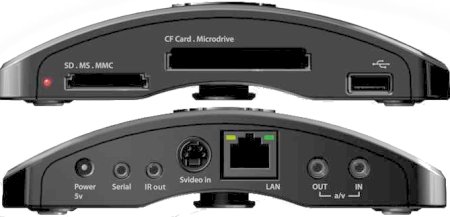Linux device gains UPnP stack
Jul 19, 2007 — by LinuxDevices Staff — from the LinuxDevices Archive — 2 views [Updated Jul. 20] — Neuros Audio reports that a Google Summer of Code project ported UPnP software to its Linux-based “Open Source Device” (OSD). Users hook the OSD to their stereo, network, and TV, and use infrared remote controls to browse and play their digital music collection.
[Updated Jul. 20] — Neuros Audio reports that a Google Summer of Code project ported UPnP software to its Linux-based “Open Source Device” (OSD). Users hook the OSD to their stereo, network, and TV, and use infrared remote controls to browse and play their digital music collection.
The Neuros OSD is a small media adapter based on a dual-core (RISC/DSP) Texas Instruments processor. The device comes standard with a Linux-based software stack aimed at letting users record MPEG-4 video from cable or broadcast TV, DVDs, etc., and then transfer it to portable media players. However, the device has a completely open architecture, and Neuros encourages creative hacks for it by publishing specifications and software development kits, and maintaining development communities.

The OSD, front and back
(Click to enlarge)
The OSD's new UPnP software was apparently created by Pau Minoves “Progeny” Rafanell, with mentorship from Ugo Riboni, as part of a Google Summer of Code project. The software lets the OSD browse and playback media files on local area network-based UPnP servers — for example, Windows Media PCs, TwonkyVision servers, and home NAS devices made by Infrant, Buffalo, and others.
Neuros founder Joe Born has published a brief YouTube video demonstrating how UPnP works on the OSD. The video also features an in-development port of the xmms2 multimedia player, which is shown using SMB networking to play music files stored remotely on a Windows PC.
Demo of UPnP on the OSD
(Click to play YouTubevideo)
Neuros recently announced plans to maintain three firmware “levels” for the OSD:
- “Dev” — Latest nightly builds
- “Beta” — Some internal testing
- “Official” — The most thoroughly tested, stable and least frequent
The UPnP/xmms2 build is currently available in the “Dev” firmware image. However, “It will migrate to 'official' as soon as it's ready,” Born said.
He added, “It's still got some issues to be ironed out. It needs to be optimized.”
More details are available on the Neuros community website.
This article was originally published on LinuxDevices.com and has been donated to the open source community by QuinStreet Inc. Please visit LinuxToday.com for up-to-date news and articles about Linux and open source.